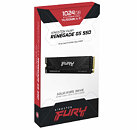ATP Extends Endurance of Its Industrial 3D TLC SSDs
ATP Electronics, a global leader in specialized storage and memory solutions, has once again achieved a breakthrough in extending the endurance of its industrial 3D triple level cell solid state drives (3D TLC SSDs). The N651Si/N651Sc Series now boasts an unparalleled 11,000 program/erase (P/E) cycles endurance - an unprecedented 120% leap from its initial published endurance of 5,000 cycles, making these solutions the highest-endurance industrial native TLC SSDs built on 512 Gb integrated circuits (IC) package.
This remarkable achievement is made possible through ATP's outstanding capabilities that extend the inherent qualities of the NAND flash. The use of prime NAND package, strict NAND IC characterization, 100% NAND screening and validation capabilities, as well as ATP's proprietary firmware, specialized hardware configurations, and own-developed technologies made this extraordinary feat possible.
This remarkable achievement is made possible through ATP's outstanding capabilities that extend the inherent qualities of the NAND flash. The use of prime NAND package, strict NAND IC characterization, 100% NAND screening and validation capabilities, as well as ATP's proprietary firmware, specialized hardware configurations, and own-developed technologies made this extraordinary feat possible.






















































































